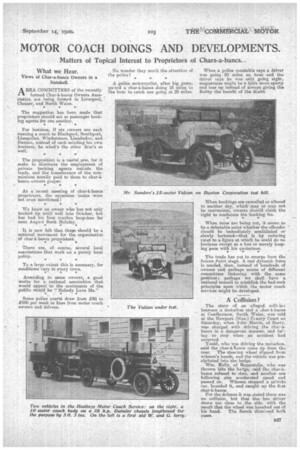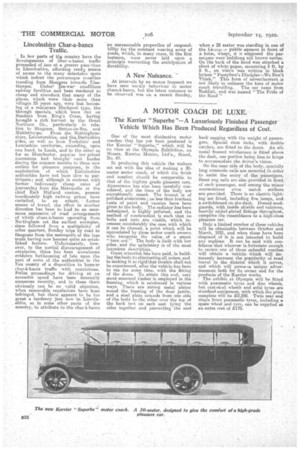MOTOR COACH DOINGS AND DEVELOPMENTS.
Page 21

Page 22

If you've noticed an error in this article please click here to report it so we can fix it.
Matters of Topical Interest to Proprietors of Chars-a-bancs.
What we Hear.
Views of Char-a-bancs Owners in a . Nutshell.
AREA COMMITTEES of the recently formed Ohar4-bancs Owners Association are being formed in Liverpool, Chester, and North Wales.
The suggestion has been made that proprietors should act as passenger booking agents for one another.
For instatrice, if six owners are each running a coach to Blackpool, Southport, .'Llangollen, Windermere, Llandudno, and Buxton, instead of each minding his own • business, he mind's the other firm's as well.
The proposition is a useful pne, for it .seeks to eliminate the employment of private booking agents outside the trade, and the transference of the oommissions usually paid to them to char4-banes.-owners, proper.
At a recent meeting of char-1.-bancs pluprioters, the excursion trains were not even mentioned!
We know an owner who has not only booked up until well into October, but has had his four coaches bespoken for next Augm,tBank Holiday;
• It is now felt that there should be.a, national movement for the organization of char-I-banes proprietors.
' There are, of coarse, several local associations that work on a purely local policy.
To a large extent this is necessary, for conditions vary in every toi,:n.
According to some owners, a good motto for a national association that would appeal to the sentiments of the public would be `,` Nobody Luvs Me."
Some police courts draw from £40 to £100 per week in fines from motor coach owners and drivers. No wonder they merit the attention of the police A police motorcyclist, after big game,pai:sed a char-a-bancs doing 18 miles to the hour to catch one going at 25 miles.
When a police constable says a driver was going 20 miles an hour and the driver says he was only going eight, magistrates might• be a little more-sporty and toss up instead of always giving the Bobby the benefit of the doubt.
When bookings are cancelled or altered to another day, which may or may not be convenient, owners should claim the
right to confiscate the booking fee. *
When rates are being cut, it seems to be a debatable point whether the offender should be immediately annihilated or slowly tortured—that is by reducing rate to a figure at which be could do no business except at a loss OT merely keeping pace with his notation:.
The trade has yet to emerge from the laissez fairs stage. A real dynamic farce is needed, then, instead of hundreds of owners and perhaps scores of different committees tinkering with the same problem; perhaps we shall have a national council to establish the bed-rack principles upon which the motor coach services might be developed.
A Collision?
The story of an alleged colli iou between a motorbus and a char-h-bancs at Coedkernew, South Wales, was told at the Newport (Mon.) aunty Court on Saturday, when John Morris, of Barry, was charged with driving the char-1banes in a dangerous manner, and fai'ing to stop when an accident had occurred.
Youtd, who was driving the motorbus, said the char---hancs came up from the rear. The steering wheel slipped from witness's hands, and the vehicle Was precipitated into the hedge, Wm. Kelly, of Rogerstaie, who was thrown into the hedge, said the char-h, banes refused to stoo, and another one following also accelerated speed and passed on. Witness stopped a nevato car, boarded it, and caught up the first char -a-basics.
For the defence it was stated there was no collision, but that the bus driver drove too close to the side, with the result that the wheel was knocked out of his hand. The Bench dismissed both cases.
Lincolnshire Char-a-bancs Traffic.
' In few parts a the country have the developments of :char a-banes traffic proceeded of late at a peater paceehan in Lincolnshire affording read e means of access to the many delectable spots which indent the picturesque mainline trending from Skeekess towaela• Cleethorpes. Underpre-war' conditions railway facilities had been rendered so cheap and abundant that many of the places, which were little more than villages 25 years ago, were fast becoming of a miniature Blackpool type, the through specials which were run on Sundays from 'King's Cross, having brought a rich harvest to the Great Northern Co., particularly in relation to Skegness, Sutton-on-Sea, and Mabletheepe. From the Nottinghamshire, Leicestershire, and theaDerbyshire sides, as well as from Yorkshire and Lancashire territories, extending, upon. one hand, to Leeds, and in the other as for as Manchester, popular low priced excursions had broughte vast hordes "during the summer months to these new outlets for pleasure purposes,. in the exploitation of which Lineolnshire authorities have not been slow to participate; and, although in contrast with former ludicrously cheap rates of journeying from the Metropolis or the chief East Midland centres, present inordinately high railway prices have curtailed to an extent, , former means of travel, the effect in another direction has been to lead to an enormous expansion of road arrangements of which chars-it-banes operating from Nottingham set the earliest examples, since followed from a multiplicity of other quarters, Sunday trips by read to Skegness from the metropolis of the law trade having now become quite an established feature. Unfortunately, however, to the partial discouragement of enterprise, there has been unwelcome evidence forthcoming of late upon the part of some of the authorities in the Fen county of a disposition to hamper char-aabancs traffio with restrictions. Police proceedings for driving at an excessive speed have been unusually numerous recently, and to these there obviously can be no valid objection, when reasonable regulations have been infringed, but there appears to be foo great a tendency just now in Lincoln. shire, as in some other parts of the country, to attribute to the char-a-bancs Am unreasonable proportion of responsibility for the constant wearing away of roads, which, in many cases, in the first instance, were never laid upon a principle warranting the anticipation of durability. .
A New Nuisance.
At intervals by no means frequent we have seen unruly behaviour -in motor chars-e-bancs, but the latest nuisance to be observed was on a recent Sunday, when s28 seater was standing in one of the Lieerje ei public souares in front of a hotel, where, it is -supposed the passengers were imbibing nut brown nectar. On the back of the hood was attached a sheet of white paper, measuring 3 ft. by 2 ft., on which was written in black letters " Puasyfoot's Disciples—We Don't Think." This form of advertisement is not likely to enhance the tone of motor coach travelling. The car came from Reddish, and was named "The Pride of the Road "




























